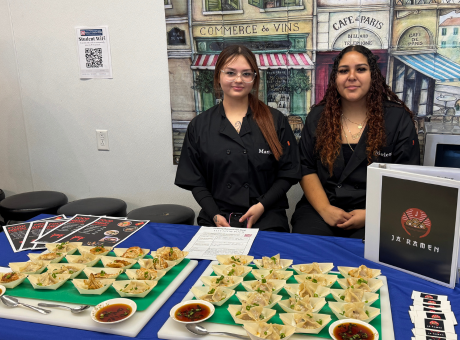Earlier this month high school students from the San Diego County Office of Education’s (SDCOE) Juvenile Courts and Community Schools (JCCS) rolled up their sleeves and got to work in the kitchen during the first-ever Culinary and Entrepreneurship Camp.
The weeklong camp, held at SDCOE’s Linda Vista Innovation Center and Sweetwater Union High School District’s Chula Vista Adult School campus, welcomed 11 students from 37ECB and Monarch schools. Both schools are a part of SDCOE’s JCCS program, which serves students referred by social services, probation, or one of the 42 districts in San Diego County.
The camp provided students with hands-on training in the culinary arts while also introducing them to the entrepreneurial side of the food and hospitality industry. Throughout the week the students learned the fundamentals of kitchen work, cooking, and food safety, as well as how to develop a restaurant concept from the ground up.
With guidance from SDCOE educators Chef Nate Shelby from JCCS, Carrie Lane from Educational Technology, and Kat Loyd from the Linda Vista Innovation Center, the students worked collaboratively in teams to create menus, test recipes, and build comprehensive business plans for their own restaurant concept. Guest speakers – including local financial professionals, marketing consultants, and restaurant operators – offered industry insights and real-world advice to students.
“I didn’t know it would be so expensive to start a food truck,” said Jesus, a student at 37ECB, as he explained his group’s restaurant concept The Slider Garage and business plan. Each team worked within a budget of $600,000 to launch their concepts, and had to budget for everything from restaurant materials and supplies, to paying for unexpected incidents, like hitting a pothole while on the road and spilling sauce everywhere.
Jesus and his groupmates were inspired by their own love for burgers and cars, and thought the concept would be a fun one to work on. “Sliders can be simple but fresh ingredients can make a real big difference, and we learned a lot about growing vegetables during camp,” said Jesus. “Chef Nate really inspired me, and I can for sure see myself as a chef and working in a kitchen someday.”
Upon completion of the camp, Jesus and his peers are one step closer to making that idea a reality.
The camp is part of SDCOE’s state-certified culinary pre-apprenticeship program – the first of its kind in the county. The program is registered with the California Division of Apprenticeship Standards, and each student who has completed the program – including the 11 students who completed the camp – receive a pre-apprenticeship certificate of completion, as well as supplies and resources to help them land a job (uniforms, nonslip shoes, knife set, and prepaid $100 transportation card), an interview opportunity with Kitchens for Good, and ongoing services and one-on-one support from SDCOE staff to not only land, but keep their job.
“The camp is about more than cooking,” explained Ernesto Rivera, a project specialist with SDCOE’s Work-Based Learning team. “It’s about giving these students the skills, confidence, and support they need to pursue a career in the culinary field, or really any other industry. A lot of the skills they learned throughout the week are transferable to any job they might hold – how to work with and make decisions with a team, how to work within a budget, and how to work through unexpected challenges.”
For many students, the camp experience went far beyond what they expected. “I was nervous, but we came together quickly and I had fun,” said Jacella, a student at Monarch School. “It was honestly one of the most amazing experiences.”
While the Culinary and Entrepreneurship Camp was the first for SDCOE, it serves as a successful model for additional camp experiences with other industries that are slated to launch in the 2025-26 school year.


Dining and Cooking